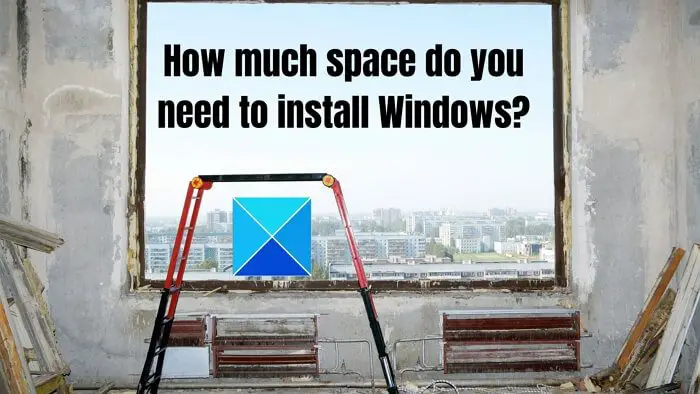When purchasing a Windows PC or a Laptop, you must always have wondered about the storage. How much is enough for day-to-day usage? How much does Windows installation take up? What should the partition size of the C drive or the system drive on which you will install Windows? All these lead to confusion for new users, and we will help you figure out how much space you need to install Windows 11/10.

How much space do you need to install Windows 11/10
When installing Windows on an old or new PC, you can either format the C drive and then install or delete old Windows files and then install. In both cases, Windows will install and overwrite any file that was already there with new ones. In short:
- Windows 10 needs a minimum hard disk space of 16 GB for 32-bit OS and 20 GB for 64-bit OS.
- Windows 11 needs a 64 GB or larger storage device.
The storage space recommendation is only for the OS, including the default apps preloaded with Windows. The requirement will increase if you add anything more using a custom script. Here is the list of factors that affect the total requirement:
- The version of Windows you plan to install (Clean Install)
- The versions of Windows previously installed on the machine (In case you are upgrading, i.e., Windows.OLD folder containing files)
- Amount of free storage space available from Windows files to reuse, such as the virtual memory pagefile or hibernation file (Can be configured post-installation)
- Applications are installed on your device, and how those applications store data. (Post Installation scenario)
- When updating, Windows will attempt to free up enough space automatically (Automated)
- Updates installed post-installation.
When creating a new partition for Windows installation, always have double or triple the recommended space. You won’t be just working with Windows, but you will be installing apps, downloading files, storing files, and many other things. If you are setting up a gaming PC, you might even need more.
While Windows allows you to install or move applications on another drive, everything works best when installed on a Windows System drive. So always account for that.
Related: Windows 11 System Requirements – Feature-wise Minimum Hardware discussed
How long does it take to install Windows?
There is no straight answer as it will depend on the hardware configuration. Keeping the Processor, RAM, and Motherboard the same depends on the type of storage. Usually, it is nVME > SSD > HDD. In modern-day hardware, it usually takes under 30 minutes to install Windows, while the older device may take up upto 60 minutes.
What can you do if you don’t have enough storage space?
If you are upgrading Windows, and do not have the required storage space, then first choose what you can remove from the PC, take a backup of the user file and then try. If this also doesn’t work, you can choose to clean install.
Can you remove apps from Windows installation Files?
Yes, it is possible to remove pre-loaded apps from Windows ISO. However, you will need to use a custom tool to do it. Software such as NTLite allows you to download the latest Windows Updates, add languages, drivers, applications, Windows settings configuration, and so on.
Leave a Reply